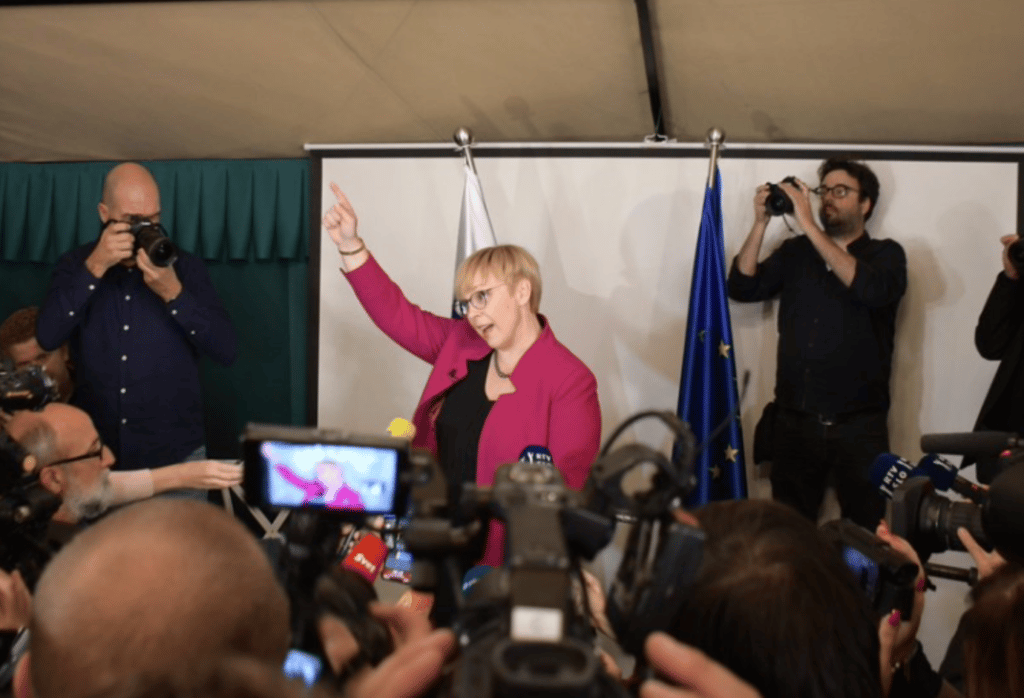Slovenia elected its first ever female president over the weekend. When polls closed on Sunday night, Natasa Pirc Musar secured 53.8 per cent of the votes, ahead of her centre-right opponent, the former Foreign Minister Anže Logar, who had just over 46 per cent.
Over half the population of two million turned out to vote on Sunday, voting in Pirc Musar as their leader. The 54-year old human rights lawyer, former TV presenter and former head of the country’s data protection authority led her campaign on LGBTQ+ rights, democracy, and tolerance.
On the outskirts of the capital, Ljubljana she addressed a crowd of supporters as the results came in, saying, “We need to unify to be able to do something good for our beautiful homeland.”
“My first task will be to open a dialogue among all Slovenians,” she said. “In the democratic election, Slovenians have shown what kind of a country they want.”
“All my life I’ve advocated the same values: democracy, human rights, tolerance. It’s time to stop dealing with the past. Many things have to be done in the future.”
Pirc Musar promised to be “the voice of women” and a “moral authority” in her new role.
Ahead of Sunday’s vote, she told the AFP news agency, “The president cannot be neutral … and have no opinion. I have never been afraid to speak out.”
As her victory became clear, Pirc Musar wrote on Twitter, “There has never been such a campaign in Slovenia. I am proud of my staff, all the volunteers, and a little of myself, of course. I am satisfied, thank you all very much. I look forward to new challenges.”
Pirc Musar worked as a journalist and presenter on Slovenia’s main news programme before gaining additional training at CNN.
She studied at Salford University in Manchester before undertaking a PhD in law at Vienna University.
As a lawyer, she was part of a team who worked to protect the interests of Melania Trump, who was born in Yugoslavia, now part of present-day Slovenia, in 1970. Pirc Musar’s team worked during Donald Trump’s US presidency, preventing companies from attempting to commercialise products with his wife’s name.
During her election campaign, Pirc Musar was criticised over the sprawling business empire she co-owns with her entrepreneur husband Aleš Musar. Commentators were weary over their lucrative network of companies, and allege that the couple have put some of their fortune into tax havens.
Pirc Musar will now step into a position that is largely seen as a ceremonial role. However, she will be able to exercise her powers in nominating prime ministers, members of the constitutional court, and appoint members of the anti-corruption commission.
“Because of my non-partisan backpack, I can talk to everyone,” she tweeted after her win. “And I sincerely want to talk to Mr. Janša as well. As soon as I take office, I will meet with all the presidents of the parliamentary parties to unify on strategic issues.”
Janez Janša is the former populist prime minister who was axed in April by a center-left liberal coalition after accusations of divisive and undemocratic policies.
Slovenians are now hoping Pirc Musar’s victory will boost the country’s current liberal leadership.
Pirc Musar has said she plans to do things differently to Borut Pahor, the outgoing president, who rarely got involved in domestic political issues during his two terms in office.
When she entered the presidential race in September, Pirc Musar said she has “never been quiet when it was necessary to speak up, especially not in the last two years.”
“After the last Janez Janša government took over I spoke out, because the rule of law was falling apart before our very eyes,” she said.
Slovenia became independent amid the breakup of Yugoslavia in 1991 and has been a member of the EU since May 2004.


